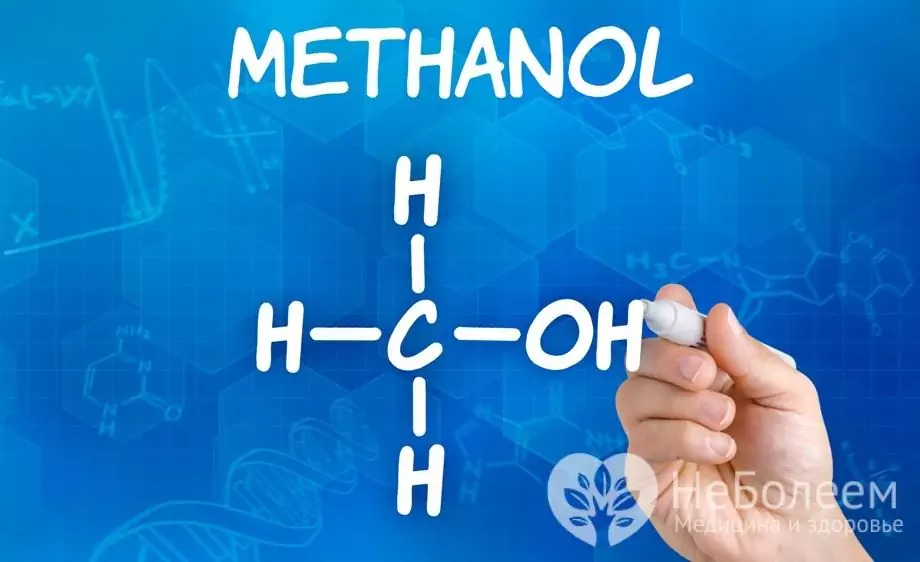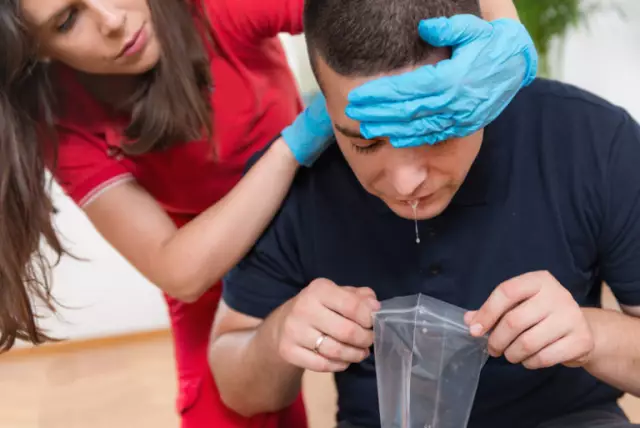- Author Rachel Wainwright wainwright@abchealthonline.com.
- Public 2023-12-15 07:39.
- Last modified 2025-11-02 20:14.
Methyl alcohol poisoning
Methyl alcohol (wood alcohol, methanol) is the simplest monohydric representative of the homologous series of alcohols. It is widely used as a stain remover, antifreeze and solvent.

Source: depositphotos.com
Ingestion of methanol is extremely dangerous, since its oxidation in the human body produces toxic substances that cause serious poisoning, often with irreversible consequences.
How does methyl alcohol poisoning occur?
Methyl alcohol poisoning usually occurs when you accidentally ingest it or liquids containing it by mouth in order to achieve a state of alcoholic intoxication, when it is mistaken for ethyl alcohol. Much less often methyl alcohol poisoning occurs during suicidal attempts.
Once inside, methyl alcohol from the stomach and small intestine quickly enters the bloodstream. Metabolism occurs in the liver with the participation of the enzyme alcohol dehydrogenase. This produces formic acid and formaldehyde - chemical compounds with high biological toxicity. About 15% of methanol metabolites are excreted from the human body through the lungs unchanged, and the rest through the kidneys, which causes kidney damage.
Methyl alcohol and its decay products also affect the cardiovascular and nervous systems and have a pronounced cumulative effect. When methyl alcohol enters the body, it causes a sharp depression of the functions of the central nervous system, damage to the retina, degenerative processes in the fibers of the optic nerve, as well as the development of severe metabolic acidosis.
Even a relatively small dose of methyl alcohol is toxic to humans: only 5-10 ml of this substance, taken internally, can lead to loss of visual function, and 30 ml can be fatal.
Poisoning symptoms
Signs of methyl alcohol poisoning:
- abdominal pain;
- nausea and vomiting;
- dizziness, headache;
- the appearance of a veil or flies before the eyes;
- increased salivation;
- tachycardia;
- an increase in blood pressure, quickly replaced by a sharp drop;
- dyspnea;
- aggressiveness, replaced by a state of indifference, stunning.
In the absence of medical care, signs of intoxication increase, verbal contact with the victim is lost, his skin becomes wet and cold to the touch. Involuntary urination occurs, floating movements of the eyeballs appear, an alcoholic coma develops.
Severe coma is characterized by the appearance of marbling of the skin, which is associated with a violation of the processes of microcirculation and stasis of blood in the capillaries, as well as hypoxia caused by respiratory distress. The pupils are dilated, the eyelids are swollen, there is a pronounced tachycardia, breathing is weakening more and more, pain sensitivity is lost. Against the background of an increase in respiratory and cardiovascular insufficiency, a lethal outcome can occur.

Source: depositphotos.com
First aid for methyl alcohol poisoning
As soon as the fact of methyl alcohol poisoning is established, you should call an ambulance and only then start providing first aid.
If less than two hours have passed since the intake of methyl alcohol inside, then first aid should begin with gastric lavage. The victim is given a few glasses of warm water or 2% sodium bicarbonate solution (baking soda) to drink, after which they induce vomiting by irritating the root of the tongue.
Reception of sorbents is not shown. This is because methanol is absorbed into the bloodstream almost instantly.
A specific antidote to methyl alcohol is ethyl alcohol. Therefore, after washing the stomach, the victim can be given 50-60 ml of good vodka. Then he should be put on his bed on his side (to avoid aspiration by vomit or sunken tongue) and covered with a warm blanket, making sure that there is a flow of fresh air. Until the arrival of the ambulance team, the patient should not be left unattended.
When is medical attention needed?
In case of methyl alcohol poisoning, in all cases it is necessary to seek medical help as soon as possible.
Treatment of patients with methyl alcohol poisoning is carried out in the toxicology department, and in severe cases, in the intensive care unit.
Since the antidote of methyl alcohol is ethyl alcohol, patients are allowed to take 40-100 ml of vodka every three hours. When the patient is unconscious, 5% ethyl alcohol is administered intravenously.
To accelerate the elimination of methanol metabolic products from the victim's body, forced diuresis with alkalinization of blood plasma is shown.
In order to accelerate and improve metabolic processes, vitamin therapy with the inclusion of folic acid is prescribed.
When seizures occur, Sibazon, Sodium oxybutyrate are administered.
If acute renal failure develops, hemodialysis sessions may be required.
The increasing severity of respiratory failure is the basis for transferring the patient to mechanical ventilation.
Possible consequences
In case of mild methyl alcohol poisoning for 2-3 days, the victim's condition stabilizes, but complications rarely develop, the most frequent of which are:
- loss of visual function up to complete blindness;
- acute renal failure, which can become chronic.
In severe poisoning, it is often fatal.
Prevention
To prevent methyl alcohol poisoning, store this substance and liquids containing it in a locked cabinet. The packaging must be brightly labeled to indicate that the liquid is poisonous.
In industries that use methyl alcohol, for the prevention of poisoning, special substances are usually added to it, which either cause its coloring or give it a sharp unpleasant odor.
Methyl alcohol in a toxic concentration can be found in alcohol surrogates, as well as in counterfeit alcoholic beverages produced by artisanal methods. Therefore, for the prevention of methanol poisoning, alcoholic beverages should be bought exclusively at official outlets whose activities are licensed.
YouTube video related to the article:

Elena Minkina Doctor anesthesiologist-resuscitator About the author
Education: graduated from the Tashkent State Medical Institute, specializing in general medicine in 1991. Repeatedly passed refresher courses.
Work experience: anesthesiologist-resuscitator of the city maternity complex, resuscitator of the hemodialysis department.
The information is generalized and provided for informational purposes only. At the first sign of illness, see your doctor. Self-medication is hazardous to health!






